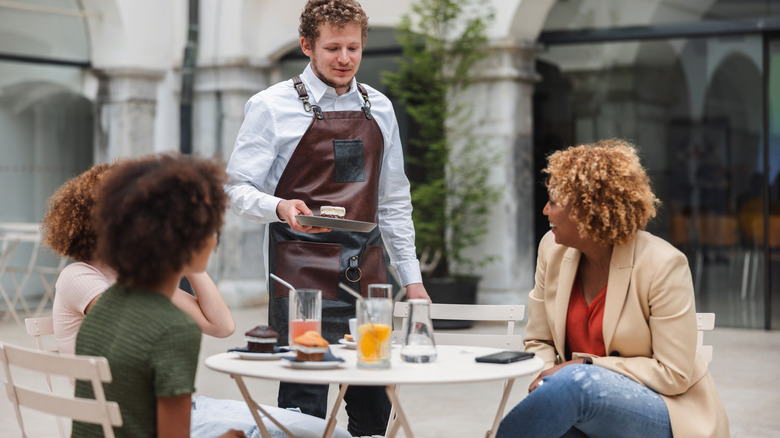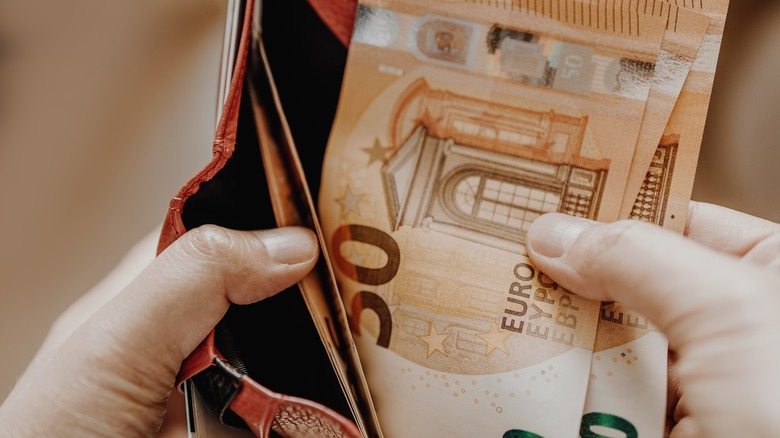Rick Steves Has A Tip For Getting The Bill Quickly While Dining Out In Europe
One of the most exciting parts of pretty much any travel experience is getting to enjoy the local dining experience wherever you go. You can try the iconic fugu — aka pufferfish — in Japan, or learn the ins and outs of your eating utensils in Thailand, or sink your teeth into some must-have Italian bites on a local food tour. Everywhere you go has its own set of tasty delights and cultural norms that are well worth the experience.
However, these new norms and must-do's don't always come easily. And aside from the "Europeans don't believe in water" debate that has recently taken the online world by storm (with some people saying it's hard to find water in Europe), there's one more quirk when it comes to dining across Europe that leaves U.S. travelers feeling a little confused: the fact that the bill doesn't come until you explicitly ask for it, especially in destinations like Spain, France, and Italy.
So, what does travel expert and TV host Rick Steves like to do when he wants to get his bill as quickly as possible? According to his blog, he'll wait for the waiter to come over to the table after dessert. When the waiter asks if anyone wants any coffee, he uses that as — in his own words — "the perfect opening to ask for the bill."
In Europe, you need to ask for the bill to get it
Steves isn't being excessive when it comes to asking for the bill while visiting Europe. In fact, he's pretty spot-on with his recommendation. How so? Well, while in the United States, most waiters will "anticipate" you asking for the bill and bring it over before you've had a chance to request it, Europeans consider it incredibly rude to spring the check out on someone before they've actually asked for it.
After all, meals are typically meant to be enjoyed slowly, with dessert, coffee, and good conversation following suit after the main dishes. Handing over someone's bill before they've even had a chance to put down their fork is basically seen as a pretty abrasive indication that you want them to leave ASAP.
To ask for the bill, we recommend learning how to say "check, please!" in the local language — it's an added touch that often comes across like you're trying to be as respectful as possible. However, if you're too nervous to try and say it as the locals do, a simple scribble-in-the-air gesture is typically a universally-understood sign that you're ready to pay. Do this, and most waiters will quickly get the message. Just don't sign across the restaurant — wait until the waiter is at your table. Alternatively, setting your card down on the table is another way to let your waiter know you're good to go.
Should you be tipping along with your bill in Europe?
Once your bill comes, there's also the question of whether or not you're required — or expected — to tip while dining out across Europe. The answer to that is ... it depends. For example, the tipping culture in Italy generally suggests that you shouldn't feel forced to leave a tip behind except when you actually want to leave a tip. Unlike the U.S., servers in Italy — and in most of Europe — don't rely heavily on tips to make a living wage. Instead, tips are seen as more of an added appreciation (a "nice to have") that lets them know they did a good job and you enjoyed their service.
The same goes for tipping in destinations like Berlin, London, and beyond. Here, tips are definitely welcome, and some establishments even add an automatic gratuity to the final bill or include gratuity as part of the menu prices. At smaller establishments or pubs where this isn't the case, rounding up to the nearest whole number is also an acceptable way of saying thank you to the staff.


